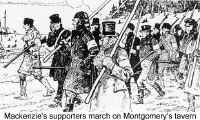
German Heritage in Canada
by Alidë Kohlhaas
Part 32
Social upheaval on both sides of the Atlantic
 Today,
when we speak of Canada, we mean a vast country that spreads from
Newfoundland to British Columbia, is bordered by three oceans, whose
northern reaches contain the north magnetic pole and its northernmost point
is a promontory on Ellesmere Island at lat. 83°07’ N, and whose
southernmost point is Middle Island in Lake Erie, at lat. 41°37’ N, in
other words, further south than Florence, Italy, and Barcelona, Spain.
Today,
when we speak of Canada, we mean a vast country that spreads from
Newfoundland to British Columbia, is bordered by three oceans, whose
northern reaches contain the north magnetic pole and its northernmost point
is a promontory on Ellesmere Island at lat. 83°07’ N, and whose
southernmost point is Middle Island in Lake Erie, at lat. 41°37’ N, in
other words, further south than Florence, Italy, and Barcelona, Spain.
Yet, even today, with all the knowledge available about our part of the globe to anyone interested, with Internet connections from here to every part of the world and back, and despite our constant efforts in United Nations peace keeping, and major contributions to technology and space exploration, etc., Canada remains an enigma to the outside world. Not because we, here, choose it to be, but because several centuries ago our space was associated solely with ice and snow in the minds of people on the other side of the Atlantic, and it is now almost impossible to erase that earlier, ignorant impression.
So, it should not come as a surprise that in the early-to-mid-19th century this vast area, then usually referred to as British North America, was not only an unknown piece of real estate to would-be European settlers, but an undesirable one. Besides, it was confusing to hear references to Newfoundland, New Brunswick, Nova Scotia, Lower Canada and Upper Canada, and New Caledonia (British Columbia). Even in Britain, the "mother country", all of these colonies were just something to exploit for fur and timber. Little else was known about them. At best, Newfoundland was the place where codfish, a staple on British tables, came from.
Curiously, even before Canada became the name for the confederated colonies on July 1, 1867, the British and subsequently, the various German governments, began to refer to the eastern portion of that vast space as Canada, rather than refer to each colony as an independent unit. Much to the annoyance of New Brunswickers, for example, letters from abroad were usually addressed to Fredericton or St. John, N.B., Canada. Would-be immigrants to this province were landed in Quebec City, or in a United States port rather than in New Brunswick because of the wrong advice, borne out of lack of knowledge, given them in Liverpool.
Each of these colonies developed differently, and underwent different political upheavals. In Upper Canada, now Ontario, the Family Compact held sway. Its members had aristocratic pretensions, and grabbed land for themselves, while making it difficult for ordinary people to obtain title to land, and discouraging non-British settlers through often corrupt means. Reformers attempted to make changes, but to little avail. Finally, in 1837 William Lyon Mackenzie began setting up vigilance committees to whom he advocated the use of force. At the same time in Lower Canada, now Quebec, les Patriots under the leadership of Louis-Joseph Papineau, formed similar groups advocating rebellion. They were discontented with the rule of bureaucrats, the British, and also corruption. Needless to say, both rebellions were quelled. Some of their members were executed, some deported to Australia, others exiled to Bermuda, while still others fled to the United States, including Mackenzie.
 This
restless period in Upper and Lower Canada coincided with political, social
and environmental upheavals in Europe. Poor English, Irish and Scottish
arrived throughout the 1820s and ‘30s in large groups. They were people
that England didn’t know what to do with. Few, if any, immigrants appear
to have arrived from the German states at that time although huge problems
existed there as well.
This
restless period in Upper and Lower Canada coincided with political, social
and environmental upheavals in Europe. Poor English, Irish and Scottish
arrived throughout the 1820s and ‘30s in large groups. They were people
that England didn’t know what to do with. Few, if any, immigrants appear
to have arrived from the German states at that time although huge problems
existed there as well.
In 1832 these poor British brought with them cholera, which spread through Montreal and Quebec City, killing 7,800 between June and September. As far as French Canadians were concerned, the epidemic was the fault of the British government for dumping the destitute into Canada, that of profit-hungry merchants, and colonial officials in league with businessmen. They lumped all of these into one, thus making the villain "the English." This was a contributing factor to the rise of nationalism in Lower Canada.
Then in the 1840s things became especially bad in the southwestern German states, and their rulers began to look for ways to rid their fiefdoms of paupers. Hesse, Würtenberg and Baden forsook opposition to emigration because of extreme poverty in these states. It was seen as a main means "to restore the balance between the number of souls and production," in a pre-industrial, agrarian economy. In these states, life and economy depended on agriculture and wine-growing. But, because of the practice of division of landholdings among succeeding generations, rapidly multiplying peasant families and the trades relying on farming, no longer had sufficient land or means to support themselves. When land agents from the British North American colonies knocked on their doors, the governments of these states began to see mass emigration as a panacea for their ills.
To be continued . . .
Comments to: alide@echoworld.com
